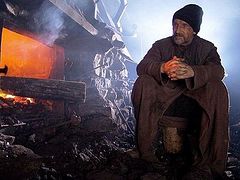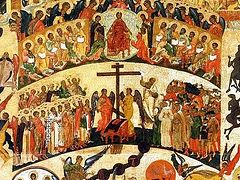 Depiction of the Last Judgement by Pavel Ryzhenko, over the doors of a church.
Depiction of the Last Judgement by Pavel Ryzhenko, over the doors of a church.
If someone in a crowd shouts, “Fire!”—won’t everyone immediately lose their calm and composure of soul and start looking for an exit; and if there is no exit, then won’t they be overcome by fear that makes them forget everything and look only for some way to save their lives? Well, the holy Church is crying out, “The judgment is at the doors! The fire of Gehenna is already burning in many souls!” But people hear this almost with indifference, and no one makes hardly a move in order to do at least something for the salvation of their perishing souls. If a person sees even in a dream the flames of a terrible fire, then won’t he wake up from the horror? The Church paints a picture in people’s minds of the Last Judgment and the fire of Gehenna with all the attributes capable of awakening people from their spiritual sleep. But people are unmoved by any descriptions and carelessly continue to remain in spiritual sleep, often to the very end of their lives.
Why is man so careless about his perishing soul? Obviously because he does not believe all that the holy Church teaches through the lips of Christ Himself and His Apostles about the Last Judgment and Gehenna. Man thinks that it all will somehow be different, and the horrors of Gehenna will pass him by—after all, everyone lives like him, and they’re not imbued with any particular fear. Truly, in this idea of his, man is no different from a brainless sheep, following the whole flock, going where everyone else is going, and feeling horror only when he sees the approaching destruction with his own eyes. It seems to man that the horrors of Gehenna will somehow miss him. Why? Won’t he point to the senseless “perhaps it'll be alright” that he always uses in order to justify his carelessness, negligence, and laziness? Carelessness is the fruit of not believing in eternal torments. If there were living faith in eternal torments, if man only knew that torments are inescapable—just as a man will inescapably get burned if he doesn’t run from a fire—wouldn’t he be more careful? Remember your last hour, and you will never sin. These words of the wise Sirach would be fulfilled in him.
People do not believe in eternal torment, or they believe but think that it won’t be so horrible as it’s described in the Gospel. Why? Can’t there be eternal torment? Can’t we allow that there are such torments? After all, eternal torments begin on earth, man carries them in his heart even before crossing into life beyond the grave. Let those who don’t believe in eternal torments tell us: Who never suffers while living on earth? Who lives all his days happy, contented, and without any sadness? After all, happiness is a rare flower that people seek all their lives without finding what they want. And if they find it, how quickly does that flower fade! And how much suffering there is when obstacles stand in the way; so much torment from envy, from various suspicions, from the fear of losing what’s dear.
People so often seem to be filled with the joy of life. All of them laugh, but who of those laughing does not at times languish with a feeling of emotional emptiness that nothing can fill—a feeling of disappointment, displeasure, and wearisome, killing boredom. If happy people do not count the hours, then how tediously the time goes by for many, and for anyone during many days and years of his life. How one longs to “kill” this torturous time! Who isn’t swallowed up by weariness? Who has never felt that there is something missing in his life? And doesn’t this weariness, or the feeling of a lack of something very needed, despite all the apparent happiness, darken life’s happiness? Isn’t this kernel of weary torment in the soul the kernel of eternal torment? And what is there to say about the torments of conscience? Who hasn’t experienced them? After all, every act against the conscience leaves a bitter aftertaste in the soul, disturbance, anxiety, and torment! And how much anxiety do we experience every day? How much adds up throughout the course of a whole life?
If you look carefully, you’ll see in every human joy the glimmer of tears, and feel the breath of sadness, sorrow and torment if that person disregards his conscience and does not think about the Gospel commandments. On the contrary, look at a true Christian—at how bright are his face and spiritual disposition despite any great deprivations; how he never falls into hopeless despondency, and finds a source of peace in everything. In his tears you’ll notice the glimmer of higher, unearthly and eternal joy. The happiness of a sinner is a beautiful apple with a worm-eaten core. But the sorrow of a righteous man is a slight scratch on the skin of an apple with a healthy core. The happiness of the first—for all the visible, continual joy—is eaten away by the undying worm that torments his conscience. The latter endures sorrows in this world but they are harmless to his heart, which carries within it the sprouting seed of eternal life.
And nothing can assuage the anxiety and torment of the sinner’s soul. Although many anxieties are quickly smoothed out like waves crossing the sea, this doesn’t mean that they have disappeared without a trace, because another wave will rise up in another place. After all, impaired bodily health does not go away without a trace but just remits for a time, only to gradually accumulate and progress, finally leading to the complete breakdown of health, sickness, and death itself. For if health never broke down, then what would prevent a man from living forever? It’s the same in the soul—no anxieties disappear without a trace! And how many of them accumulate until they bring on total ruin in the life of the soul! What torment is then created in the soul! Truly, a man reaps what he sows. He brings torment to his own self, to his own deeds, he eateth and drinketh damnation to himself, according to the apostle (1 Cor. 11:29) by living unworthily.
Nothing the soul has accepted almost unconsciously disappears from it without a trace—for example, the atmosphere, people, and situations that surround us. Perhaps some people’s entire lives are formed under the influence of these surroundings. And if a person continually receives tempting thoughts into his soul—and from secret thoughts come feelings, desires, and deeds against the conscience arising in the soul—then how many of these bad traces accumulate in the soul, things the person accepted daily, hourly, every minute throughout the long years of his life? Man as if traces and creates his future image with each deed and thought, like a painter or photographer. And even if this image is now dark and undeveloped, it will someday be developed like a photographic image by the Lord at the Last Judgment, when the Lord will bring to light the hidden things of darkness (1 Cor. 4:5).
Truly, the “undying”, “unsleeping” worm about which the Lord speaks is not the invention of the human mind. This worm is born and grows in the torments of the conscience during earthly life. After all, there are so many suicides! Don’t people kill themselves because they can’t bear the unbearable, unquenchable torments of conscience, which have already begun? The torments of broken happiness, of deceived hopes, the ruination of their desired way of life? And Gehenna is not a phantom. The fire of the passions, which contain torment in themselves, is already the beginning of the fires of Gehenna that will burn and not be quenched if a person neglects to extinguish it in this earthly life.
That is why the saints strove so hard to always remember the judgment and fires of Gehenna, as did for example St. Ephraim the Syrian, who, “lamented bitterly, clearly foreseeing the judgment”. This is why our ancestors always kept the memory of the Last Judgment in their minds. The conversion to Christianity under Prince Vladimir began with a visual and verbal depiction of the Last Judgment. Worshippers always left the church with the remembrance of the Last Judgment depicted over the threshold, refreshing their memory of it with pictures on the walls of their homes, and with spiritual songs, etc.
And to contrary, when their later descendants grew slack in their remembrance of the Last Judgment, they also began to forget Christ’s commandments! They remember better what occupies them, what is more pleasant to them. They forget about the Last Judgment, because the memory of it could destroy the joys of earthly life; they forget about it, thinking that it’s a long way off to the Judgment and no one knows when it will be. Just as people do not worry about earthquakes that will not come soon—so they think—or that will come at an undetermined time, so neither do they worry about the coming Judgment, and their unbelief only hardens their careless state. Just as people before the Flood did not want to believe Noah’s preaching, so also now do people remain in negligent unbelief—especially since modern science very often suggests that the Flood and the Last Judgment are just empty fairy tales. They think, “How can the Judgment be so terrible if the Judge is Christ, Who is filled with such great love for people, with meekness and forgiveness?” But this meekness will only increase our fear of the Judge. If a sinner who lives on earth is so afraid of a righteous one that he tries to keep his distance from him and not meet up with him, then how will he meet face to face with Christ, the meek and sinless Righteous One, when he remembers all the acts he committed that angered Christ, all the days of his life? The meek countenance of Christ will be a pure mirror in which all the impurity and unrighteousness of their lives will be reflected! And although the Lord’s countenance remains unchangeably meek, won’t this very meekness gather burning coals on the heads of sinners (Prov. 25:22; Rom. 12:20)? Woe to them in whose hearts these burning coals do not ignite flaming repentance during earthly life. Because of their stony-heartedness, these coals will turn into the unquenchable fire of Gehenna!
How we also need to keep a strong memory of the Last, Terrible Judgment of Christ and the torments of fiery Gehenna! How we who live on earth need to weep and rejoice, but not about what usually makes us weep and rejoice. We need to exchange the useless sadness of the of this age for sorrow that is useful to the soul in eternal life; to prefer endless joy in Christ over vain and fleeting joys! How we need to follow after the holy Church, sighing from the depths of our souls, and pray, “I shall pour out my prayer unto the Lord and to Him do I confess my grief, for my life is filled with evils, and my soul hath drawn nigh unto hell!” Or, with the words of the song of this present feast: “Woe is me, O darkened soul! How long will you not turn away from evil? How long will you weep with despondency?.. Why do you not tremble at the terrible judgment seat of the Savior?” And, “When I think of that terrible day and lament my evil deeds, how shall I make my vows to the immortal Judge? With what boldness shall I look upon the Judge, wretch that I am? O Merciful Father, Only-Begotten Son, and Holy Spirit, have mercy on me!” Amen.







